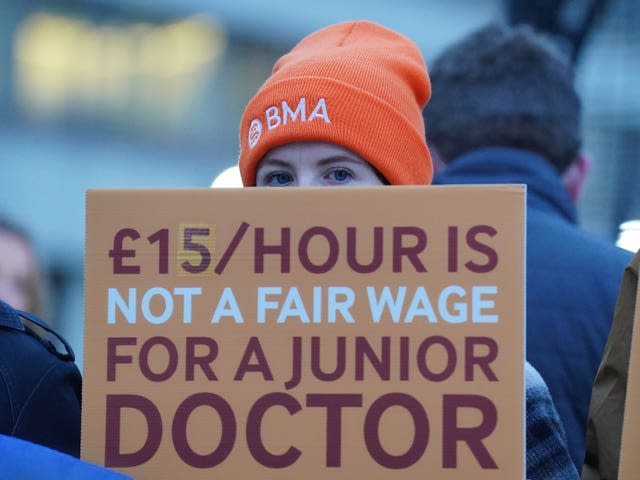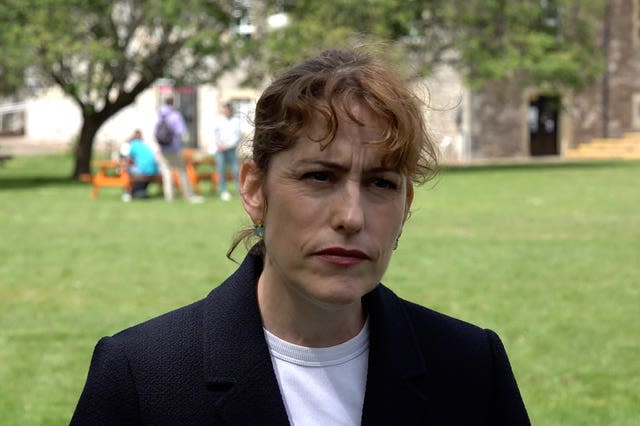Junior doctors to stage pay strikes during election campaign
Junior doctors in England are to stage a five-day strike in the run-up to the General Election.
Talks had recently reopened with a view to ending the long-running dispute over pay between medics in training and the Government.
After the July 4 election was called last week, the British Medical Association (BMA) gave the Government “a final opportunity to make an offer and avoid strikes” but “this opportunity has not been taken up”.
Junior doctors, let's make sure full pay restoration stays front and centre during this election. We strike again with a 5 day full walkout from 7am on 27 June to 7am on 2 July. Let's make this round of action our biggest and loudest yet! #DoctorsStrike https://t.co/iMjSqMgU1Y pic.twitter.com/l51cnQw6uZ
— Junior Doctors (@BMA_JuniorDocs) May 29, 2024
The union announced that junior doctors will stage a full walkout from 7am on June 27 to 7am on July 2.
The co-chairmen of the BMA junior doctors committee, Dr Robert Laurenson and Dr Vivek Trivedi, said in a statement: “We made clear to the Government that we would strike unless discussions ended in a credible pay offer.”
They added: “For more than 18 months we have been asking Rishi Sunak to put forward proposals to restore the pay junior doctors have lost over the past 15 years – equal to more than a quarter in real terms.
“When we entered mediation with Government this month we did so under the impression that we had a functioning government that would soon be making an offer. Clearly no offer is now forthcoming. Junior doctors are fed up and out of patience.
“Even at this late stage Mr Sunak has the opportunity to show that he cares about the NHS and its workers.
“It is finally time for him to make a concrete commitment to restore doctors’ pay.

“If during this campaign he makes such a public commitment that is acceptable to the BMA’s junior doctors committee, then no strikes need go ahead.”
The strike will come as a significant blow to Mr Sunak and will conclude just two days before the election.
Just two weeks ago the Government and the BMA announced that they had entered mediated talks to try and prevent further walkouts.
The walkout at the end of June will be the 11th strike by junior doctors in the current dispute.
The last strike by junior doctors, from February 24 to 28 this year, led to 91,048 appointments, operations and procedures being postponed.
Rishi Sunak said the timing of the announcement of the strike, on the same day as Labour pledged to cut NHS waiting lists, “makes it look incredibly political”.
The Prime Minister was asked whether the planned walkout is an indictment of his time in office as he took questions from the media during a campaign visit to Devon.
Mr Sunak said: “Today’s action by the junior doctors, on the same day as the Labour Party are having a health day, does slightly ponder the question as to whether this is politically motivated.
“It’s hard to escape that conclusion, given the timing and to call a strike in an election campaign, especially as we found a constructive resolution with the remainder of the NHS workforce.
“We started with a million NHS workers under the Agenda for Change deal, including physiotherapists and many others. And most recently, we reached an agreement with the consultant doctors.
“So it’s just the junior doctors that have failed to find a resolution with the Government, and that’s in spite of them already being offered a pay deal that is worth on average a 10% increase, a 10% increase already, and we were prepared to keep talking.”
Meanwhile, the Health Secretary challenged Labour to condemn the junior doctors’ decision to strike during the election campaign.

Writing on X, Victoria Atkins said: “Today should be the day the Labour Party finally condemn junior doctor strikes.
“Announcing this during an election and on Labour’s health day shows this was only ever political and not about patients or staff.”
She described the junior doctors’ decision as a “highly cynical tactic”, adding: “This Conservative Government has taken the tough decisions to keep public spending down to bear down on inflation, which is now back to normal.
“Labour would be in the hands of their union paymasters – meaning more spending and higher taxes.”
Sir Keir Starmer said it is “unforgiveable” the Government has not reached a pay settlement with junior doctors.
Speaking to broadcasters during a campaign visit to the University of Worcester, the Labour leader said: “Firstly I’m shocked that we’re in this position because this has been going on a very long time.
“I think the Government should have resolved it and negotiated a settlement. And what they’ve effectively done is kicked it to the other side of the General Election. That’s unforgivable.
“Obviously I don’t want the strike to go ahead. I don’t think health staff want to go on strike and it really impacts on patients. So I don’t want it to go ahead.
“But if we are privileged enough to come in to serve, then it will fall to us to settle this and to come to an agreement so the NHS gets back to working in the way that it desperately needs to for so many people on the waiting lists.”
Asked about the dispute on ITV’s Good Morning Britain, Labour’s shadow health secretary Wes Streeting said: “I want to be really upfront with junior doctors this side of the election – the 35% pay claim they’ve put in … I’m just not going to be able to afford that on day one of a Labour government.
“We’re going to have to work together and negotiate on pay and recognise – as was the case with the last Labour government who inherited a similar mess – getting to fair pay is a journey, not an event.
“I’m willing to negotiate on pay and those wider conditions that junior doctors are working in because they complain about their rotations, their placements.
“I’ve heard some awful cases including a junior doctor whose partner had cancer, they both had kids, and the NHS showed no flexibility whatsoever about the placement for that junior doctor until there was a media outcry about the case – that’s not treating junior doctors with respect.
“They are the future of the NHS and I’m willing to sit down and negotiate on those wider conditions so that junior doctors are genuinely valued and look forward to a career in the NHS rather than thinking about whether they’re going to stick it out because things are so terrible under the Tories.”
Saffron Cordery, deputy chief executive at NHS Providers, said: “This announcement marks a worrying escalation in the long dispute between the Government and junior doctors. This strike will inevitably hit patients hard.
“Resolving the industrial dispute must now be a top priority. Not doing so will come at too high a price for patients and the NHS itself.
“Nearly 1.5 million appointments have been delayed since industrial action began, with strikes having now cost the NHS an estimated £3 billion.
“We cannot go on like this. Politicians and unions must urgently find a way to resolve all disputes for the sake of patients, staff and the NHS.”
A Department for Health and Social Care spokesperson said: “Patient safety will be the priority during industrial action and the NHS will prepare for these strikes in the usual way.
“It will work closely with unions to discuss any patient safety concerns and ensure safe staffing for emergency care continues to be available.”


